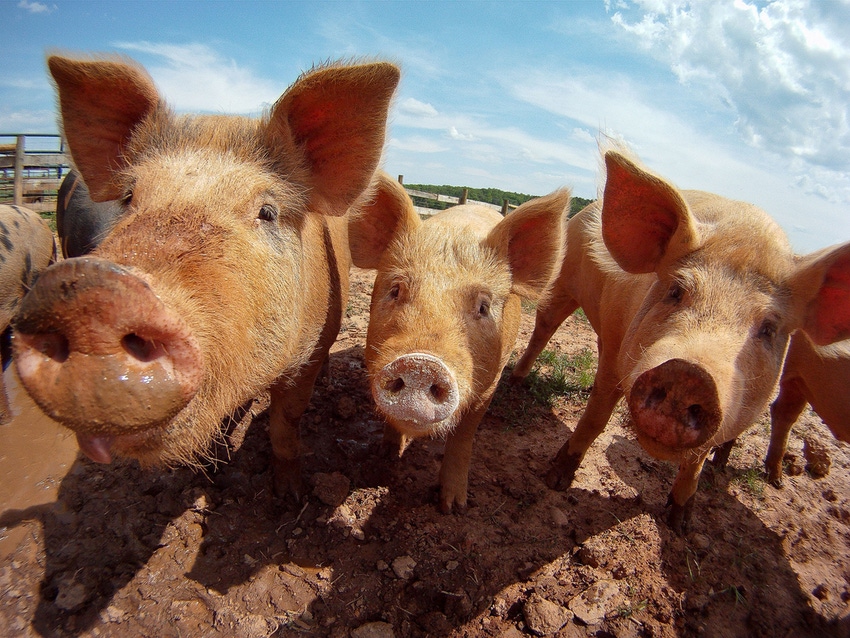Taking production beyond 'commodity treadmill'
Local farmer looks to new way of raising pigs.

Russ Kremer, a diversified, fifth-generation family farmer, once raised hogs in a conventional production system. However, in 1993, he contracted an antibiotic-resistant infection from an injury sustained by a boar. Concerned that the way he was raising his hogs led to the antibiotic-resistant bacteria, Kremer altered his production course by culling his herd and starting over.
Today, Kremer raises about 1,600 hogs annually without antibiotics, hormones or growth promotants. He also sources fiber-rich, non-genetically modified organism (GMO) feed and uses heritage genetic breeds, which he believes leads to a more flavorful end product.
As U.S. consumers have become more interested in things like food ingredients, animal welfare and the environment, Kremer said his business has naturally thrived. He has personally made calls to Costco and Whole Food as well as other major distributors to build a marketing relationship.
Kremer’s philosophy is that farmers should be listening to and having a dialogue with consumers rather than treating them like the enemy. “We realized when we sit down with them and have two-way dialogue [that] they understand what our challenges are on the farm, and we understand what their concerns are,” he said.
Kremer follows a value chain concept that includes:
Knowing what consumers want;
Coming up with the price it would take to deliver that good to the consumer, and
Building in a fair return on investment for producers.
“Unlike the commodity model, our farmers were given an opportunity, not a guarantee, to make a fair profit on every single pig that they produced,” Kremer said.
Kremer took the concept to customers and got their commitment to support such a system.
Today, Heritage Foods is the most prominent non-GMO fed, antibiotic-free, humanely raised pork program in the country. “I started that about 12 years ago, and to this day, that system works very well,” Kremer said.
The model even has expanded into a growing network of farmers across the Midwest. The average herd size in the network is approximately 2,000 hogs marketed annually. Some producers raise 500 hogs per year, while others have up to 1,200 sows, producing about 24,000 hogs per year.
“It’s growing. Farmers are very happy because they make money consistently,” Kremer told Feedstuffs.
As consumer preferences have changed, margins in his model have increased. A farrow-to-finish operation in the network is currently making a premium of $25-30 per head over what the market is today.
“Farmers are getting tired of this commodity treadmill,” he said. “I’ve never been more excited than I am today.”
As of right now, Kremer’s network is marketing 2,500-3,000 hogs per week, and plans are in the works for a modern, community-based processing plant, which will most likely be located in Missouri. The group plans to process 2,000 hogs daily in a single shift. More plants will likely be built after that in strategic places where farmers have access to the necessary feedstuffs, he said.
Kremer also recently became chair of a farmer advisory board for a new company called Palindromes, a vertically integrated community of wholly owned subsidiaries, affiliates, joint ventures and collaborative partners that work in agricultural genetics, inputs and production; value-add food processing; commodity trading; ports and logistics; risk management; marketing; building products and construction materials; energy-interdependent processes in all applicable fields, and the commercialization of environmentally conscious technologies.
Palindromes also recently purchased a controlling stake in Kremer’s company, Hope Ventures, an integrated model for functional food and feed.
Palindromes will soon be releasing a model for pork production with Hope Ventures. The model, under Kremer’s leadership, has several key components, including
High-end swine genetics -- durability, immunity and biodiversity;
Humane raising, living conditions and slaughtering;
Nutritious, antibiotic-free feed;
A quality management system, and
Transparency and traceability.
Unique attributes
Kremer said he has done a lot of research on fat chemistry to find feedstuffs that produce a product with healthy fats. More conventional feeds, he said, contain polysaturated fats, which makes very soft pork. As such, he searched for fiber and feedstuffs that have more monosaturated fats.
“We’re a big proponent of small grains. We feed a lot of grain sorghum, barley, peas and wheat,” he said.
Also, while producers are feeding some soybeans, Kremer said he is working Palindromes to get access to an exclusive line of high-oleic soybeans, which he said is a healthier fat that makes the pork firmer, more desirable and more nutritious.
In terms of genetics, older heirloom lines are used that thrive in more natural surroundings. Kremer said he alone has preserved some genetics from 30 years ago, but with more than 100 producers in the network, there is access to a wide variety of genetics.
The heirloom lines, he explained, are able to utilize more roughage and fiber that ultimately produces good-quality meat.
According to Kremer, other advantages to the pork model include more natural biosecurity, since most farms are in areas that have lower hog populations. Additionally, processing plants are smaller and designed for a community-based system. “We think having them scattered, having them in less concentrated areas, really helps,” he said.
Kremer pointed out that none of the farms in the network contracted porcine epidemic diarrhea virus when it erupted a couple of years ago.
Producers also try to source locally, including their feed ingredients. The network prohibits the use of animal-based feed ingredients and tries to avoid sourcing feed ingredients from other countries, especially regions that have animal disease issues.
About the Author(s)
You May Also Like

.png?width=300&auto=webp&quality=80&disable=upscale)

